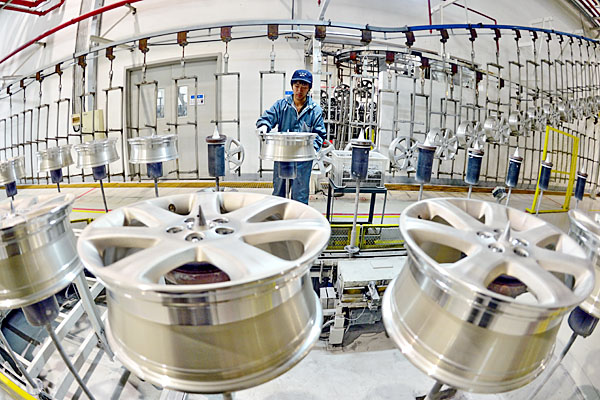China can maintain its economic growth
- By John Ross
 0 Comment(s)
0 Comment(s) Print
Print E-mail China.org.cn, August 13, 2014
E-mail China.org.cn, August 13, 2014
Earlier this year sections of the Western media tried to spin a story that the world economy was experiencing 'severe slowdown in China' and 'strong recovery in the U.S.' – China's economy was allegedly in trouble and the U.S.'s doing well.
|
Workers run a wheel production facility in Qinhuangdao-based CITIC Dicastal Co. Ltd., north China's Hebei Province. [Xinhua photo] |
Now that the actual data is in for the first half of the year, it shows that the opposite was true. China's economic growth rate was 7.5% in the year to the second quarter of 2014, and the U.S.'s economic growth rate was 2.4% - China's economy grew more than three times as fast as that of the U.S.
Still more significantly for the U.S., its own statistical agencies and the IMF have officially revised their projections for long term US growth down – both organizations now estimate it at only 2%. The Economist, somewhat cruelly, put a cartoon of the US as a tortoise on its front cover, stating bluntly that U.S. 'long term growth has slowed.'
My calculations for the U.S. economy are marginally more optimistic. Over the last 20 years, U.S. average annual growth was 2.4%, and there is no short term reason why it should slow. But this is just a minor detail, since either estimate means the US will remain on a path of 2-3% annual growth.
What are the comparative prospects for China's economy – not over the next few months, but over the longer term, say to 2020? Answering this requires going beyond immediate news events and short term fluctuations, to the fundamental factors determining China's economic development.
Right at the beginning, it should be clarified that the medium/long term aim of China's policy is not to maximize GDP growth. This is explicit; indeed, it has become commonplace in China recently to say that what matters is not the quantity of growth, but its quality.
But unless it is specified what the criteria for 'quality' are and how 'quality' is to be measured, this becomes an empty, clichéd phrase, of the type China's President Xi Jinping stressed must be avoided. The only correct measure of 'quality' can be the overall well-being and national security of China's population, summarized by China's goal of 'comprehensive national renewal.'
This correctly contextualizes economic growth. Economic growth is not an end in itself, but is an absolutely indispensable means to achieve the desired ends. International comparisons show more than 80% of consumption growth, and over 70% of life expectancy extension – the latter reflecting factors such as health care and environmental quality – is the result of economic growth.






